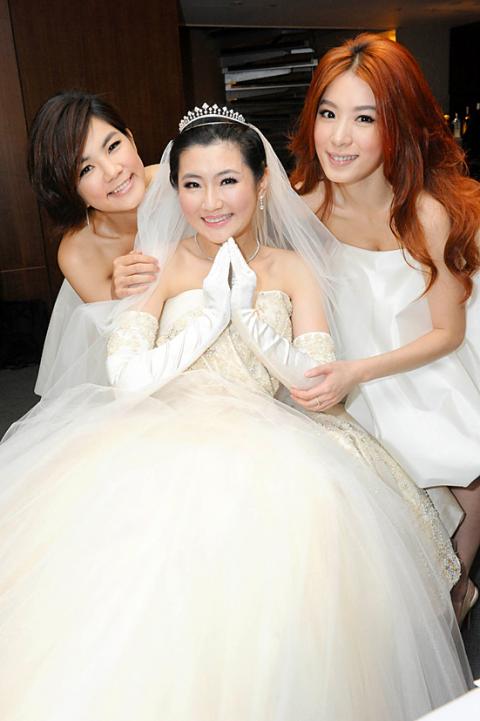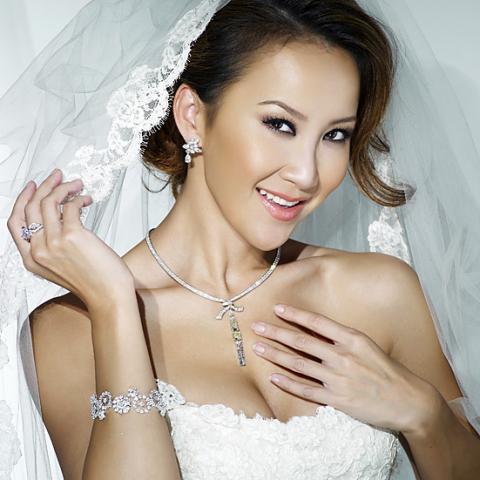As 2011 draws to a close, celebrities have made this the year of the showbiz wedding.
Over the past 10 months, a slew of A-listers, including self-styled actress Barbie Hsu (徐熙媛, aka Big S), TV sweetheart Patty Hou (侯佩岑), star couple Christine Fan (范瑋琪) and Charles Chen (陳建州, better known as Blackie), singer Stephanie Sun (孫燕姿) and belle Kelly Lin (林熙蕾) have tied the knot.
The nuptials that received top media billing were those of pop singer Selina Jen (任家萱), who wed 39-year-old lawyer Richard Chang (張承中).

Photo: Taipei Times
Following a year of medical treatment for serious burns she sustained while filming a TV show in China in October last year, Jen, a member of girl band S.H.E, was married on her 30th birthday, on Monday.
The event, full of warm, touching moments as the teary-eyed bride received blessings from friends and relatives, attracted more than 200 members of the media.
Because of her injuries, Jen sat through most of the three-hour-long wedding reception. The Apple Daily reported that the star underwent eight hours of rehabilitation each day since suffering multiple third-degree burns and cannot stand for longer than five minutes without taking a break.

Photo: Taipei Times
Not ones to let romance go to their heads, gossip hounds spent the evening sniffing out awkward moments between celebrity guests who are erstwhile lovers or old rivals.
Attention focused on pop diva Chang Hui-mei’s (張惠妹, better known as A-mei, 阿妹) old flame Wang Lee-hom (王力宏) and rumored new love Harlem Yu (庾澄慶). Much to the dismay of members of paparazzi, Wang and Chang were seen conversing over drinks amicably.
“We are good friends,” Wang told reporters.
Things were less peaceful between Jolin Tsai (蔡依林) and Patty Hou, who reportedly stole Jay Chou (周杰倫) from Tsai in 2004. In response to years-old rumors of a feud between her and Tsai, the married Hou claimed she often bumped into Tsai at the airport, and they always greet each other.
“Did I do that?” Tsai replied when asked to comment on Hou’s remark.
Meanwhile, in Hong Kong, international star Coco Lee (李玟) became the subject of admiration and envy when she wed 52-year-old Canadian businessman Bruce Rockowitz in a lavish ceremony on Thursday last week.
In terms of sumptuousness, Lee and Rockowitz’s nuptials lead the field, with two days of celebrations that reportedly cost NT$600 million. The wedding was rated by the press as the most expensive to be held in Hong Kong.
Readers might wonder how hundreds of millions of NT dollars could be spent in just two days, but with more than 300 guests flying in from the four corners of the world to attend the ceremony and stay at the Ritz-Carlton hotel, all courtesy of the newly weds, it’s not such a surprise.
Entertainment was provided by Grammy-winning musicians Bruno Mars, Alicia Keys and Ne-Yo, while the Shaw Brothers Film Studio, which, according to the Liberty Times (the Taipei Times’ sister paper), is normally not allowed to be rented out for private use, was turned into a playground for the rich and powerful.
Guests who graced the event included fashion designer Tommy Hilfiger and Christopher Patten, the last governor of Hong Kong.
Jennifer Lopez, Oprah Winfrey and Beyonce, however, didn’t show up as previously promised.

Google unveiled an artificial intelligence tool Wednesday that its scientists said would help unravel the mysteries of the human genome — and could one day lead to new treatments for diseases. The deep learning model AlphaGenome was hailed by outside researchers as a “breakthrough” that would let scientists study and even simulate the roots of difficult-to-treat genetic diseases. While the first complete map of the human genome in 2003 “gave us the book of life, reading it remained a challenge,” Pushmeet Kohli, vice president of research at Google DeepMind, told journalists. “We have the text,” he said, which is a sequence of

On a harsh winter afternoon last month, 2,000 protesters marched and chanted slogans such as “CCP out” and “Korea for Koreans” in Seoul’s popular Gangnam District. Participants — mostly students — wore caps printed with the Chinese characters for “exterminate communism” (滅共) and held banners reading “Heaven will destroy the Chinese Communist Party” (天滅中共). During the march, Park Jun-young, the leader of the protest organizer “Free University,” a conservative youth movement, who was on a hunger strike, collapsed after delivering a speech in sub-zero temperatures and was later hospitalized. Several protesters shaved their heads at the end of the demonstration. A

Every now and then, even hardcore hikers like to sleep in, leave the heavy gear at home and just enjoy a relaxed half-day stroll in the mountains: no cold, no steep uphills, no pressure to walk a certain distance in a day. In the winter, the mild climate and lower elevations of the forests in Taiwan’s far south offer a number of easy escapes like this. A prime example is the river above Mudan Reservoir (牡丹水庫): with shallow water, gentle current, abundant wildlife and a complete lack of tourists, this walk is accessible to nearly everyone but still feels quite remote.

In August of 1949 American journalist Darrell Berrigan toured occupied Formosa and on Aug. 13 published “Should We Grab Formosa?” in the Saturday Evening Post. Berrigan, cataloguing the numerous horrors of corruption and looting the occupying Republic of China (ROC) was inflicting on the locals, advocated outright annexation of Taiwan by the US. He contended the islanders would welcome that. Berrigan also observed that the islanders were planning another revolt, and wrote of their “island nationalism.” The US position on Taiwan was well known there, and islanders, he said, had told him of US official statements that Taiwan had not